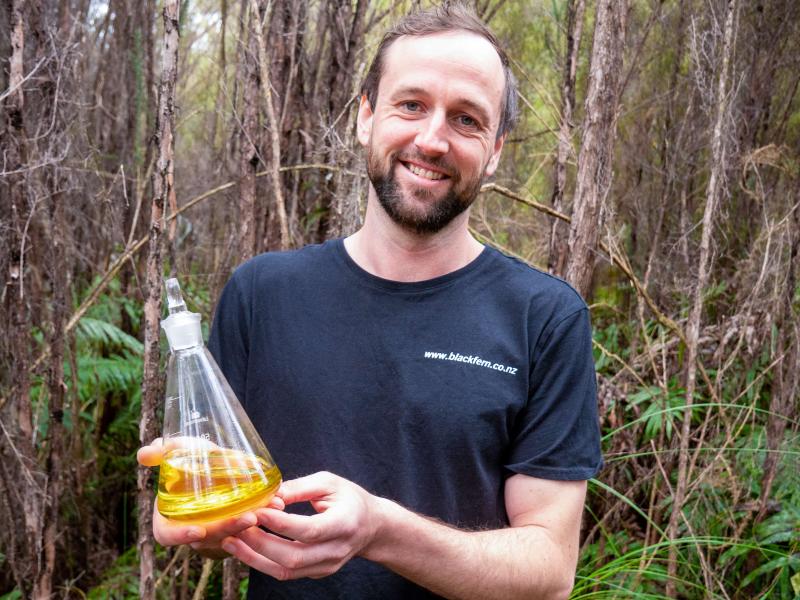The story behind the PURITI manuka honey brand is one based around genuine, authentic purity. In the historically crowded and often confusing export honey market, it's a breath of fresh air.
You can see it in the unique packaging; the labelling; and in the brand’s story. PURITI Manuka honey’s aim is to take authenticity, quality and purity to a whole new level. And it is succeeding – both domestically and in overseas markets.
In the words of PURITI’s international brand manager Adam Boot, the company set out to create a Manuka brand that is quantifiably, measurably and demonstrably superior.
“We were not happy with the status quo. PURITI simply had to be the best Manuka honey ever produced.”
The PURITI brand is a result of the Ministry of Primary Industry (MPI) introducing a legislative definition for the identification of Manuka honey, which came into effect in February 2018.
“Prior to this there was no scientific definition,” explains Adam. “Basically, if you could identify antibacterial MGO (Methyglyoxal) and Manuka pollen in the honey you could call it Manuka honey. But this was being questioned in international markets, where much of the Manuka honey actually only contained a small proportion of Manuka.
He says the MPI Manuka Honey Science Definition is now the strongest international test and all Manuka honey exported from New Zealand must pass it. However, PURITI used the new standard as just the starting point.
“We took the chemical marker pass marks and increased them by ten to 100 percent for each.
We’re also the only brand to test for glyphosate (roundup weed killer residue) and ensure zero percent content.”
All testing is listed on the product label, Adam says, making a legal commitment, and although the new MPI standard is only required for exported Manuka honey, PURITI has applied it to all its honey.
“New Zealand consumers should be entitled to just as high a quality as international consumers.”
He says there are now only two internationally recognised grading systems for Manuka honey: UMF and MGO. “Rather than have any confusion, we show both.”
Adam says PURITI’s goal is to expand the global reach and understanding of genuine Manuka honey. “To provide honest education and understanding of the properties and why it is so revered through our indigenous natural medicine and now in modern pioneering mainstream medical and surgical applications.”
He says labelling criteria and legal requirements are different outside New Zealand.
“For instance, genuine New Zealand Manuka honey tested and packed in New Zealand cannot use words such as Antibacterial, Antibiotic, Activity, Healthy, Medicinal, Medical or Active on the label to describe the product.”
He believes the bare minimum safeguard and guide to excellence when buying Manuka honey outside New Zealand, is to make sure that it was harvested, tested, certified and packed in New Zealand.
"At PURITI we define higher standards and everything we do is underpinned by honesty, integrity and transparency.”
“Remember ‘Made in New Zealand’ or ‘Produced in New Zealand’ does not always mean it was packed in New Zealand. It just means the bulk Manuka honey came from New Zealand. “Therefore the packing, labelling, testing and purity regulations may not have met the same strict standard.
“Our higher testing is on the label,” says Adam. “At PURITI we define higher standards and everything we do is underpinned by honesty, integrity and transparency.”
Packaged for clarity
Challenging convention and the status quo are the key drivers behind the PURITI brand, says Adam. “We’re determined to protect and enhance the pinnacle position of New Zealand Manuka honey – to promote its inherent rarity and unrivalled quality.
“We also created multiple levels of security to defend against counterfeits, fakes and adulteration that’s prevalent within the industry.”
Rather than use a typical ‘off the shelf’ jar design, PURITI designed and produced its own jar, he adds. “We over-engineered complexity into a simple packaging shape and threw the kitchen sink at the label design elements. The harder and more expensive it is to copy, the more likely it will fail or not be attempted at all.”
Every PURITI jar is packed at one source and protected by at least 11 separate anti-counterfeit security measures. The packaging also clearly displays both the UMF and MGO grade, so consumers receive maximum clarity.
Success overseas
Taking on international markets has been challenging but rewarding, Adam says. “Success requires a strong marketing and brand strategy, otherwise you’re just another label. A brand must be an ethos, philosophy, a direction of feeling and an experience,” he explains.
So far the markets and consumers trust the new testing and certification. “More importantly, they trust PURITI as the first brand to say we can do more and we will voluntarily adopt an even higher quality and purity threshold,” says Adam.
“Feedback, both domestically and internationally, has taken us all by surprise. We had big expectations, but the response has truly blown us away.”
Domestically PURITI gains around seven new stockists every week. After launching in mid-October 2018 they now have more than 140 stockists. Internationally, distribution agreements have been signed in the US, Germany, Hong Kong and Saudi Arabia.
“Demand has been such that we have had to create a waiting list while we evaluate incoming approaches, distribution requests and opportunities,” says Adam. “We look for one key distributor partner in each key market, and we police the integrity of our retail pricing vigorously.”
Despite its flying start, the PURITI story still has some way to go. Adam says there are some “genuinely ground-breaking innovations,” in the final stages of development.
“By mid-2019 we will have PURITI products that will again change the way consumers think about honey and its uses.”
.Glenn Baker is editor of NZBusiness and ExporterToday. The story first appeared in the April 2019 issue of NZBusiness.





